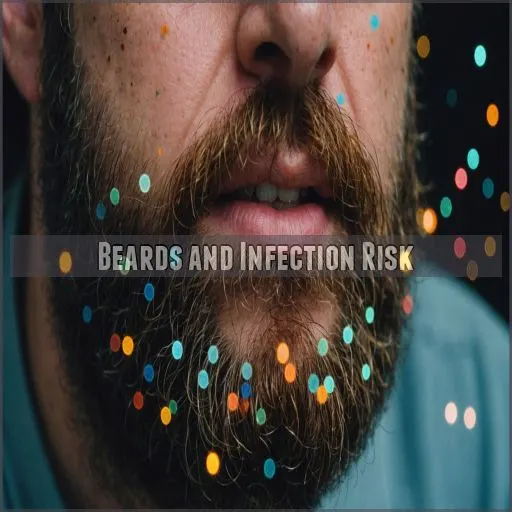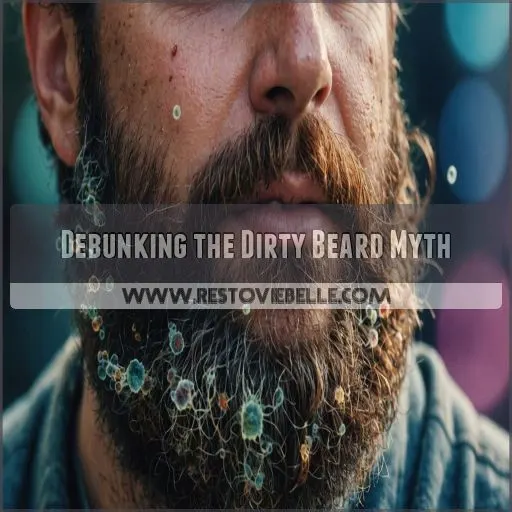This site is supported by our readers. We may earn a commission, at no cost to you, if you purchase through links.
 Curious about how much bacteria is in a man’s beard? Well, much like a well-tended garden, your beard hosts a variety of bacteria, most of which are as harmless as your neighbor’s cat. Yes, there are germs, but a well-maintained beard can have about the same germ load as a clean-shaven face.
Curious about how much bacteria is in a man’s beard? Well, much like a well-tended garden, your beard hosts a variety of bacteria, most of which are as harmless as your neighbor’s cat. Yes, there are germs, but a well-maintained beard can have about the same germ load as a clean-shaven face.
Factors like length, products, and washing habits play a big role in the bacterial population.
Think of your beard as a bustling city: a few unruly germs might pop up, but regular washing and grooming keep the peace.
Stay tuned to uncover how a good scrub can make all the difference!
Table Of Contents
- Key Takeaways
- Bacteria in Beards: the Facts
- Beards and Infection Risk
- Beard Hygiene and Maintenance
- Debunking the Dirty Beard Myth
- The Future of Beard Research
- Frequently Asked Questions (FAQs)
- How much bacteria is in beards?
- Is a man’s beard dirtier than a dog’s?
- How clean is a man’s beard?
- Can you get an infection from a man’s beard?
- How does the beard microbiome compare to other body hair?
- Can the beard microbiome be used for medical applications?
- What factors influence the bacterial diversity in a mans beard?
- How do beard grooming habits affect the bacterial load?
- Can the beard microbiome be manipulated for health benefits?
- Conclusion
Key Takeaways
- Beards, much like a cozy apartment for bacteria, carry a mix of harmless and useful bugs, along with the occasional rowdy one. However, don’t stress; washing and grooming keep your facial garden in check.
- Hygiene is your best friend. Regular washing and using specialized beard products fend off unwanted germs, ensuring your beard doesn’t double as a microbe motel.
- Believe it or not, that beard of yours might be less risky than you think. Some studies suggest bearded individuals could carry fewer harmful bacteria, such as MRSA, compared to their clean-shaven counterparts.
- The science isn’t all beard myths. Your beard is a mini ecosystem that could potentially aid in new antibiotic developments, making it a superhero in disguise if treated right.
Bacteria in Beards: the Facts
Have you ever wondered just how much bacteria might be lurking in a man’s beard?
Prepare to be surprised – the facts about beard bacteria are both fascinating and a bit unsettling.
Let’s take a closer look and explore the surprising world of bacteria in beards.
How Much Bacteria is in a Man’s Beard
How much bacteria hitch a ride in a man’s beard? Tons! But don’t lose your head over it. Beards can be perfectly hygienic with some TLC. Here are some fun truths:
- Beards can be bacterial hotels!
- Grooming and washing reduce germs on beards.
- Beard hygiene practices matter.
- Your facial hair’s microbiome might even fend off MRSA!
Types of Bacteria Found in Beards
You’ve now learned the surprising amount of bacteria in beards, so let’s chat about their types.
Beards harbor beneficial and harmful bacteria, creating a diverse microbial party on your face.
While some bacteria are harmless or even helpful, others can be less friendly.
Thankfully, regular beard washing with specialized products keeps this tiny ecosystem in check, promoting healthy skin care.
Factors Affecting Bacterial Growth in Beards
In your quest for a beard as mighty as a Viking warrior’s, remember that its bacterial population depends on a mix of beard length, products, skin type, diet, and hygiene habits.
Like a surprising science experiment on your face, factors including healthcare environments, such as hospitals, can influence how much bacteria is in a man’s beard.
Keep clean, and embrace your inner scientist!
Beards and Infection Risk
Can a man’s beard really harbor dangerous bacteria?
You might be surprised by the role beards can play in surgical site infections and hospital-acquired illnesses.
Take a closer look at the surprising facts about the bacterial risks of facial hair in healthcare settings.
Can You Get an Infection From a Man’s Beard
Worried about catching an infection from a beard? Don’t lose sleep over it!
Beards, like the scalp, need good hygiene. While beards harbor some bacteria, most are harmless. Studies suggest bearded folks might carry less MRSA than others.
Hospitals have infection control rules, but it’s not all about facial fuzz. Keep your beard clean, and you’re golden!
How Beards Contribute to Surgical Site Infections
When pondering how beards contribute to surgical site infections, consider this: good beard hygiene is your best friend!
Follow these infection control tips:
- Trim regularly to keep bacteria in check.
- Wash daily with specialized products.
- Avoid touching it during surgical protocols.
- Encourage healthcare workers to understand their beard microbiome.
Keep those whiskers clean, and you’ll trump infections!
The Role of Beards in Nosocomial Infections
You’re in the operating room, sporting surgical scrubs and a beard.
The question is, could your facial fuzz really amp up the nosocomial infection risk?
Scientists have mixed feelings.
Some say beards harbor fewer MRSA risks, while others warn they might muddle contamination control.
Don’t lose hair over it—proper beard hygiene can keep your style clean and the germs at bay.
Preventing Infections in Bearded Healthcare Workers
As a bearded healthcare worker, you play a key role in preventing surgical site infections. To minimize risks, adhere to these essential steps:
- Maintain careful beard hygiene with regular washing and grooming, using a quality beard growth oil.
- Use specialized beard products like a quality beard shampoo to keep your facial hair clean and healthy.
- Wear a properly fitted surgical mask to contain any potential shedding.
- Stay up-to-date on your organization’s beard policy and infection control protocols.
- Lead by example and encourage your colleagues to follow best practices.
Beard Hygiene and Maintenance
Keeping your beard clean is more important than you might think, as it can help ward off unwanted bacteria and grime.
By regularly washing with shampoo or specialized beard products, you make sure both a healthier beard and a happier you—after all, nobody likes a beard that doubles as a buffet for bacteria!
How to Keep Your Beard Clean and Hygienic
You’ve probably pondered the bacteria-beard link while stroking your glorious whiskers.
Keeping your beard clean and hygienic isn’t rocket science, but it does require some finesse.
Regular washing, a sprinkle of beard oil benefits, and maintaining comb hygiene go a long way.
Plus, trimming makes sure you’re not harboring a small rainforest.
Be a beard hero with a neat care routine!
Best Practices for Washing and Grooming Beards
For washing and grooming your beard, keep it simple yet effective.
Use a beard comb to detangle those stubborn knots.
A gentle brushing technique helps distribute natural oils, giving your beard a healthy shine.
Don’t forget about beard oil; it softens and tames wild hairs, making your beard look good and feel great.
Using Shampoo or Specialized Beard Products
If you want to keep your beard fresh and healthy, using a specialized beard shampoo or beard wash is a game-changer.
These products are formulated with nourishing ingredients like oils and butters to condition the hair and skin beneath, leaving your beard soft, manageable, and free of buildup.
Ditch the regular soap and treat your facial fuzz right.
Importance of Regular Beard Cleaning
Keeping a clean beard is as important as wearing shoes in snow.
Regular maintenance means you’re not hosting an unwanted bacteria party.
Here’s how to keep that beard shining and bacteria-free:
- Wash with shampoo or beard wash
- Rinse thoroughly
- Moisturize with beard oil to nourish and hydrate facial hair
- Comb daily
- Trim regularly
Your face will thank you!
Debunking the Dirty Beard Myth
Don’t believe everything you hear about beards being dirty!
While the idea that facial hair is teeming with harmful bacteria makes for sensational headlines, research shows that it’s more myth than fact, with some even cultivating the quirky notion of using beard microbes for brewing beer.
Separating Fact From Fiction in Beard Bacteria Research
You’ve mastered beard hygiene, now let’s separate fact from fiction.
Beard bacteria myths swirl like a misunderstood storm cloud.
Studies have suggested more bacteria in beards, but don’t fret.
The beard microbiome can be beneficial, helping balance skin’s ecosystem.
Yes, biases exist in research.
So, embrace your beard.
It’s not a wild beast, just your trusty sidekick.
The Poop in Beards Claim: a Scientific Review
The "poop in beards" claim was based on a small, flawed study that lacked scientific rigor. Don’t believe everything you read in the media – the reality is far more nuanced.
Bacteria aren’t inherently harmful; in fact, most are beneficial or harmless.
Keep an open mind and avoid jumping to conclusions about beard hygiene.
- Sensationalized media coverage
- Small, unrepresentative study
- Lack of scientific rigor
- Bacteria aren’t all bad
- Avoid knee-jerk judgments
Beards Vs. Other Body Hair: a Bacterial Comparison
After exploring the "poop in beards" myth, let’s talk about bacterial comparisons between beards and other body hair.
Imagine this table:
| Body Hair | Hair Length | Bacteria Density |
|---|---|---|
| Beard | Varied | Medium to High |
| Scalp | Long | High |
| Arm | Short | Low |
| Chest | Medium | Medium |
Curious how different spots influence your microbiome’s diversity? Every patch tells its own tale!
The Cultural Significance of Beards and Hygiene
Beards are more than just a style statement—a symbol of masculinity and societal norms.
In your beard journey, consider these essentials:
- Hygiene Norms: Challenge the dirty beard myth.
- Grooming Trends: Follow the latest styles.
- Beard Culture and Society: Embrace tradition.
- Hygiene Debate: Keep it clean and fresh.
Stay suave!
The Future of Beard Research
You’re stepping into a hairy topic where research is unearthing surprising findings about the bacteria living in your beard.
Who knew that what might look like simple facial fuzz could hold the key to groundbreaking antibiotics of the future?
Exploring the Beard Microbiome for New Discoveries
Intrigued by the beard microbiome? You’re not alone! Researchers are uncovering fascinating insights that could lead to breakthroughs in personalized hygiene and even new antibiotic development.
Imagine a world where your unique beard yeast helps brew your favorite beer – the possibilities are endless!
Stay tuned as this exciting field continues to unfold.
Potential Applications of Beard Microbiome Research
Think the beard microbiome‘s just for show? It might actually change medicine! Picture using it for antibiotic development or even personalized hygiene tips specific to your face fuzz.
Scientists are exploring how these beard bacteria can also aid biomarker discovery or cosmetic applications.
Who knew facial hair could have a hand in food production and beyond? Amazing, right?
The Role of Beards in Developing New Antibiotics
While you might not expect it, the beard microbiome could help in the quest for new antibiotics. Here’s how:
- Bacterial Diversity: Diverse bacteria in beards might hold keys to fighting antibiotic resistance.
- Drug Discovery: Scientists could identify new compounds for drugs.
- Clinical Trials: Testing these compounds could revolutionize medicine, giving beards a newfound scientific charm!
Frequently Asked Questions (FAQs)
How much bacteria is in beards?
You might find it surprising, but beards host an array of bacteria.
Though a 98% positivity for bacterial growth is noted, these are mostly harmless (Source).
Picture your beard as a quirky jungle of microbes!
Is a man’s beard dirtier than a dog’s?
A small study found men’s beards often harbor more bacteria than dogs’ fur, suggesting the average beard could be a vibrant microbe metropolis compared to our canine companions.
So, maybe give that beard an extra scrub! (Source).
How clean is a man’s beard?
A man’s beard, like an epic adventure, hosts a diverse microbiome, potentially housing more bacteria than clean-shaven skin.
Regular washing and grooming tame the wild whiskers but also keep those germs in check.
Can you get an infection from a man’s beard?
Your beard may harbor some bacteria, but it’s unlikely to cause infections unless you neglect basic hygiene. (Source)
Wash your beard regularly with a gentle cleanser, and you’ll keep those germs at bay.
How does the beard microbiome compare to other body hair?
Much like how a rainforest hosts diverse ecosystems, a beard’s microbiome differs from body hair in its unique bacterial mix.
It could rival scalp hair, but much remains unknown, offering a fun frontier for researchers.
Can the beard microbiome be used for medical applications?
Imagine your beard as a bustling city of microbes, some are heroes potentially brewing new antibiotics.
Researchers suggest your chin’s ecosystem may indeed have medical applications, so maintaining beard hygiene is like supervising a microbial metropolis.
What factors influence the bacterial diversity in a mans beard?
Factors like shaving habits, soap use, diet, genetics, and environmental exposure influence a man’s beard bacteria.
Think of it as a garden that thrives with the right mix of nutrients, sunshine, and a little care.
How do beard grooming habits affect the bacterial load?
You’d be surprised how your beard grooming habits can affect the bacterial load!
Lather up regularly, and you’ll keep those germs at bay.
Slack off, and you might end up with a real "beard-o-rama" on your hands!
Can the beard microbiome be manipulated for health benefits?
To harness the beard microbiome for health benefits, researchers explore its potential for developing new antibiotics.
Maintaining good beard hygiene is key, as the diverse microbes on beards hold promise for innovative medical and therapeutic applications.
Conclusion
They say cleanliness is next to godliness, and your beard deserves divine attention too!
Now that you know how much bacteria is in a man’s beard, it’s clear that with proper care and grooming, it can be as clean as a whistle.
Embrace your facial hair with confidence – just keep up with regular washing and the right products.











